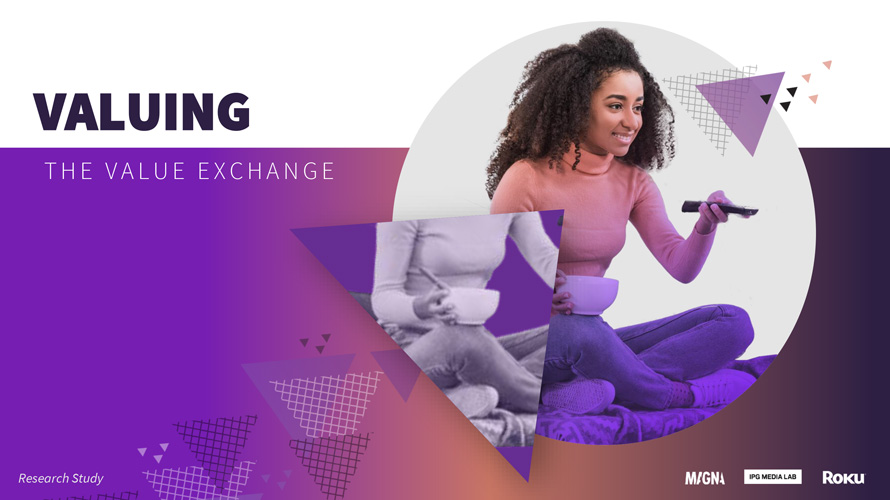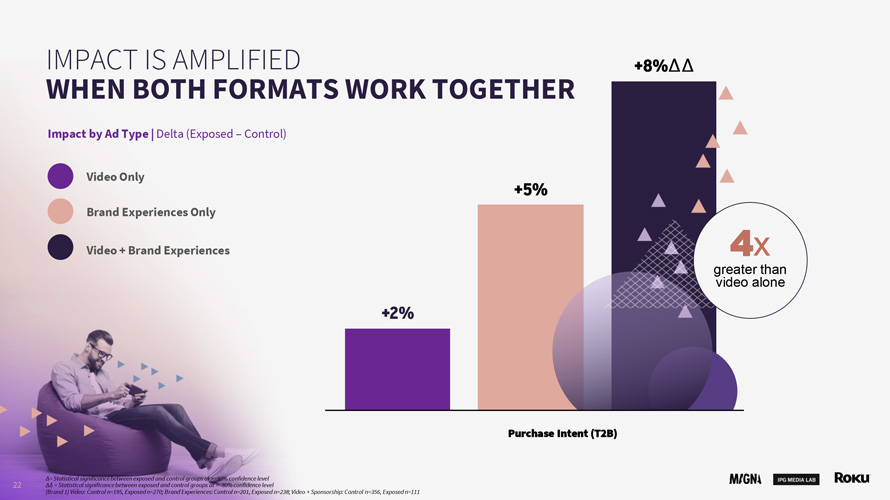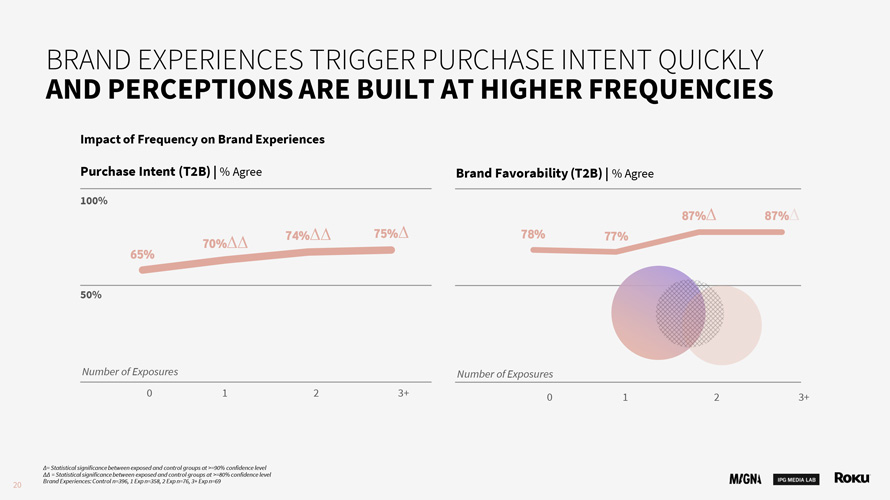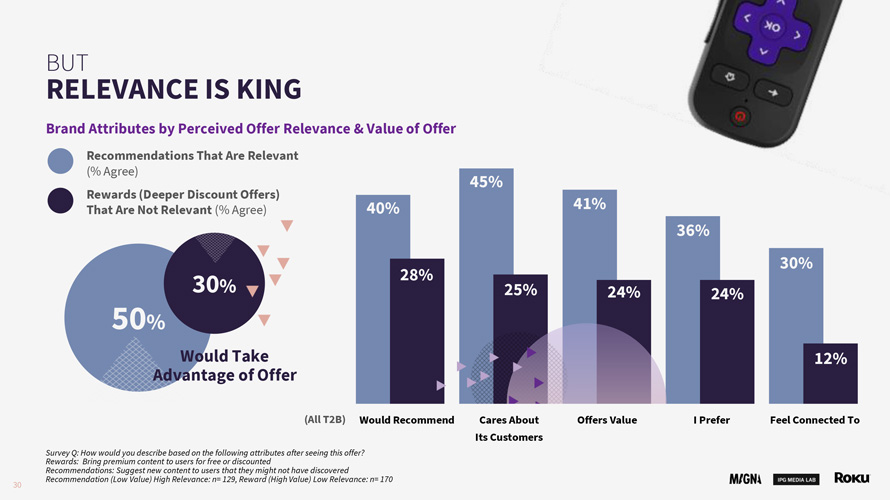Que las marcas se involucren con la cultura, es casi tan importante como lograr una percepción positiva.
México, 9 de Septiembre, 2020 – “El Impacto Cultural: lo que significa para las marcas en la actualidad”, el nuevo estudio publicado por Twitter, MAGNA e IPG Media Lab, analiza la visión de los consumidores sobre la participación de las marcas en la cultura.
Inspirado en el aumento de marcas que buscan conectar con lo que está pasando en el mundo real, así como tener influencia en las conversaciones de sus audiencias, el estudio plantea dos preguntas importantes: ¿Para las marcas, qué significa ser culturalmente relevante? ¿Qué piensan los consumidores sobre las marcas que se involucran en temáticas culturalmente relevantes?.
Los aspectos más relevantes del estudio son:
- Para el 92% de las personas en Twitter, la definición de cultura va más allá de conceptos tradicionales. Para ellas, los eventos, tendencias sociales y la cultura popular son temas de gran importancia en los que las marcas pueden participar.
- Ser culturalmente relevante es casi tan importante como tener una percepción positiva de marca. Para las personas, la participación cultural de una marca representa el 25% de la decisión de compra.
- Las marcas con mayor relevancia cultural tuvieron mayor preferencia entre los usuarios de Twitter y la población en general.
- 3 de cada 5 consumidores piensan que es importante que las marcas se involucren en temas y movimientos sociales, mientras que 4 de cada 5 consideran importante que las marcas participen en eventos y tendencias culturales.
- Los consumidores más entusiasmados con la participación de las marcas en la cultura son jóvenes, de entre 18 y 35 años, y los más apasionados e informados son los usuarios de Twitter.
- “Retribuir” es un elemento clave para que las marcas se vuelvan más relevantes culturalmente. Los usuarios de Twitter fueron más receptivos con las marcas que se enfocaron en tres pilares:
- Filantropía: el 67% de los usuarios fue más receptivo con las marcas que apoyaron causas sociales, 50% con las que apoyaron a la comunidad y 40% con las que realizaron donaciones caritativas.
- Conocimiento de los clientes: el 60% de los usuarios prefirió marcas que fueron transparentes, 58% a las que promovieron la inclusión y 52% a los que priorizaron sus necesidades como clientes.
- Actualidad: el 58% de los usuarios mostró afinidad con marcas que patrocinaron eventos culturales y 52% lo hizo con marcas que estuvieron al día con las tendencias.
“Las marcas más relevantes para los consumidores mexicanos son aquellas que logran alinearse con los factores culturales de las personas, promueven tendencias positivas y apoyan movimientos sociales”, afirmó Karla Natareno, Head of Magna para Latinoamérica. “Estos hallazgos nos permiten trabajar estratégicamente con nuestros partners y clientes para crear conexiones reales con sus audiencias”.
Por su parte, Juan Francisco Diez, CEO de Mediabrands México comentó: “En un mundo lleno de una gran oferta de productos y servicios, los consumidores preferirán siempre a las marcas que son culturalmente relevantes. Nuestra misión en Mediabrands es ayudar a las marcas a encontrar estos puntos de convergencia cultural que les permita conectar de mejor forma con sus consumidores, generando resultados tangibles para sus negocios”.
Para este estudio, se preguntó a los consumidores sobre sus opiniones en torno a la participación de las marcas en la cultura. También se realizó una encuesta para identificar los factores más importantes que los consumidores consideran al momento de tomar una decisión de compra. Los participantes fueron seleccionados al azar para calificar las percepciones hacia las marcas de 5 industrias, incluyendo su relevancia cultural.
Acerca de Twitter
Twitter es lo que está pasando en el mundo y de lo que la gente está hablando ahora mismo. Desde noticias de última hora y entretenimiento hasta deportes, política e intereses cotidianos, mostrándote cada lado de la historia. Únete a la conversación abierta. Ve los eventos de transmisión en vivo. Está disponible en más de 40 idiomas en todo el mundo, se puede acceder al servicio a través de twitter.com, Twitter Lite (mobile.twitter.com), dispositivos móviles y SMS. Para obtener más información, visita about.twitter.com, sigue @TwitterLatAm y @TwitterMexico y descarga las aplicaciones de Twitter y Periscope en twitter.com/download y periscope.tv.
Acerca de MAGNA
MAGNA es el recurso centralizado de IPG Mediabrands que desarrolla estrategias de inteligencia, inversión e innovación para equipos de agencias y clientes. Utilizamos nuestros conocimientos, previsiones y relaciones estratégicas para ofrecer a los clientes una ventaja competitiva en el mercado.
MAGNA aprovecha el poder agregado de todas las inversiones en medios de IPG para crear influencia en el mercado, negociar precios preferidos y asegurar un inventario premium con el fin de generar el máximo valor para nuestros clientes. Los equipos de inversión e innovación de MAGNA diseñan estrategias de inversión de comercialización en todos los canales, incluida la televisión lineal, impresa, digital y programática en nombre de los clientes de IPG. El equipo se centra en el uso de oportunidades emergentes de medios, así como en soluciones basadas en datos y tecnología para impulsar el rendimiento óptimo del cliente y los resultados comerciales.
MAGNA Intelligence ha establecido el estándar de la industria durante más de 60 años al predecir el futuro del valor de los medios. El equipo de MAGNA Intelligence produce más de 40 informes anuales sobre las tendencias de la audiencia, el gasto en medios y la demanda del mercado, así como la eficacia de los anuncios.
Acerca de IPG Media Lab
Como parte de la red Interpublic, IPG Media Lab identifica e investiga innovaciones y tendencias que cambiarán el panorama de los medios y cómo las marcas interactúan con sus audiencias. Desde 2006, el laboratorio ha trabajado con nuestros clientes y socios de la industria que pueden ayudarlos a adaptarse mejor al cambio disruptivo. Su experiencia, recursos y servicios de consultoría también ayudan a informar los aprendizajes, estrategias y resultados comerciales de todas las agencias de Interpublic. Para obtener más información, visita https://www.ipglab.com/ o sigue a @ipglab.
ENGLISH VERSION:
Consumers prefer brands that are culturally relevant: Twitter, Magna and IPG Media Lab
For brands, being involved in culture is almost as important as achieving positive brand perception.
México, September 9, 2020 – “The Impact of Culture: what it means for brands today”, the new study published by Twitter, MAGNA and IPG Media Lab, analyses the vision of consumers about brand involvement in culture.
Inspired by the rise of brands looking to connect with what’s happening in the real world and that have influence in their audiences’ conversations, the study poses two important questions: for brands, what does it mean to be culturally relevant? And what do consumers think about brands that get involved in culturally relevant topics?
The most relevant aspects of the study are:
● For 92% of people on Twitter, their definition of culture goes beyond traditional concepts. For them events, social trends, and popular culture are deeply important topics that brands can be involved in.
● Being culturally relevant is almost as important as having positive brand perception. A brand’s cultural participation represents 25% of the purchase decision for people.
● When brands were bucketed by cultural relevance, those with high cultural relevance were more likely to be preferred by both Twitter users and the general population.
● 3 out of 5 consumers think that it is important that brands get involved in topics and social movements, while 4 out of 5 consider it important that brands participate in trends and cultural events.
● The consumers most excited by brands participating in culture are young, between 18 and 35 years old, and those that use Twitter are the most passionate and informed.
● “Giving back” is a key element for brands that become more culturally relevant. Twitter users were the most receptive to brands that focused on three areas:
○ Philanthropy: 67% of users were more receptive to brands that support social causes, 50% to those that support the community and 40% to those that donate to charities.
○ Knowledge of your Customer: 60% of users preferred brands that were transparent, 58% those that promoted inclusivity and 52% those that prioritized their needs as customers.
○ Staying up-to-date: 58% of users showed affinity towards brands that sponsored cultural events and 52% towards brands that were up-to-date with trends.
“The most relevant brands for Mexican consumers are those that are able to align themselves with people’s cultural factors, promote positive trends and support social movements,” said Karla Natareno, Head of Magna for Latin América. “These discoveries allow us to work strategically with our clients and partners to create real connections with their audiences.”
Juan Francisco Diez, CEO of Mediabrands México commented: “In a world filled with a wide offer of products and services, consumers will always prefer brands that are culturally relevant. Our mission in Mediabrands, is to help brands find these points of cultural convergence that allow them to better connect with consumers, generating tangible results for their businesses.”
For this study, consumers were asked to give their opinions regarding the participation of brands in their culture. A survey was also carried out to identify the most important factors that consumers consider when they are making a purchase decision. The participants were selected randomly and asked to rate their perceptions of brands in 5 industries, including their cultural relevance.
About Twitter
Twitter is what is happening in the world and what people are talking about right now. From breaking news and entertainment to sports, politics and daily interests, showing every side of the story. Join the open conversation. Watch events being transmitted live. Available in over 40 languages around the world, service can be accessed via twitter.com, Twitter Lite (mobile.twitter.com), mobile devices and SMS. For more information, visit about.twitter.com, follow @TwitterLatAm and @TwitterMexico and download the Twitter and Periscope applications at twitter.com/download and periscope.tv.
About MAGNA
MAGNA is a centralized resource of IPG Mediabrands which develops intelligence, investment and innovation strategies for teams of agencies and customers. We use our knowledge, foresight and strategic relationships to offer our clients a competitive edge in the market.
MAGNA takes advantage of the power given to every investment in IPG media in order to create influence in the market, negotiate better prices and ensure a premium inventory with the goal of generating maximum value for our clients. The investment and innovation teams at MAGNA design investment and commercialization strategies in all channels, including television, print, digital and programmatic in the name of IPG clients. The team focuses on the use of emerging media opportunities, as well as solutions based on data and technology to drive optimal client performance and commercial results.
MAGNA Intelligence has set the industry standard for more than 60 years by predicting the future value of media.The MAGNA Intelligence team produces more than 40 annual reports regarding audience trends, spending in media and market demand, as well as efficacy of advertisements.
About IPG Media Lab
As part of the Interpublic network, IPG Media Lab identifies and researches innovations and trends that will change the panorama of media and how brands will interact with their audiences. Since 2006, the laboratory has worked with our clients and industry partners to help them to better adapt to disruptive change. Their experience, resources and consulting services also help inform training, strategies and commercial results for all the agencies of Interpublic. For more information, visit https://www.ipglab.com/ or follow @ipglab.




